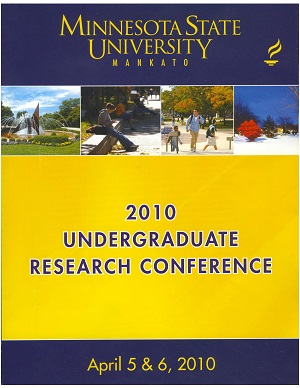Event Title
Wellness Behaviors of College Students: Connecting Implicit and Explicit Measures
Location
CSU 201
Start Date
5-4-2010 10:00 AM
End Date
5-4-2010 12:00 PM
Student's Major
Psychology
Student's College
Social and Behavioral Sciences
Mentor's Name
Karla Lassonde
Mentor's Department
Psychology
Mentor's College
Social and Behavioral Sciences
Description
College students engage in risky and unhealthy behaviors more often than the general population and it is important to know why. This project examined whether the implicit beliefs of college students regarding health were related to their wellness behaviors. Participants were asked to complete an implicit measure called the Implicit Association Test (IAT) which measures associations in memory between positive and negative concepts. Participants also completed an explicit task called the Holistic Lifestyle Questionnaire (HLQ) which is a survey that measures wellness behaviors, providing an overall score of wellness for each participant. During the IAT participants saw words associated with good health such as exercise and water paired with pleasant words such as paradise and happy or words associated with poor health such as tanning and stress paired with negative words such as evil and hurt. Response times to the word pairs were recorded. Facilitated response times for word pairs (e.g., tanning-evil or exercise-happy) would indicate these words are associated in memory. We assessed the relation between responses on the IAT and HLQ. Specifically, we wanted to assess whether or not ―healthy‖ participants, as determined by their HLQ scores, would respond more slowly when a healthy word (exercise) was paired with an unpleasant word (terrible) indicating that the two concepts are not associated in memory. We also examined if the opposite effect would occur. If participants are slower to associate healthy words with positive associations (exercise-happy), this result may indicate positive associations with unhealthy behaviors.
Wellness Behaviors of College Students: Connecting Implicit and Explicit Measures
CSU 201
College students engage in risky and unhealthy behaviors more often than the general population and it is important to know why. This project examined whether the implicit beliefs of college students regarding health were related to their wellness behaviors. Participants were asked to complete an implicit measure called the Implicit Association Test (IAT) which measures associations in memory between positive and negative concepts. Participants also completed an explicit task called the Holistic Lifestyle Questionnaire (HLQ) which is a survey that measures wellness behaviors, providing an overall score of wellness for each participant. During the IAT participants saw words associated with good health such as exercise and water paired with pleasant words such as paradise and happy or words associated with poor health such as tanning and stress paired with negative words such as evil and hurt. Response times to the word pairs were recorded. Facilitated response times for word pairs (e.g., tanning-evil or exercise-happy) would indicate these words are associated in memory. We assessed the relation between responses on the IAT and HLQ. Specifically, we wanted to assess whether or not ―healthy‖ participants, as determined by their HLQ scores, would respond more slowly when a healthy word (exercise) was paired with an unpleasant word (terrible) indicating that the two concepts are not associated in memory. We also examined if the opposite effect would occur. If participants are slower to associate healthy words with positive associations (exercise-happy), this result may indicate positive associations with unhealthy behaviors.
Recommended Citation
Morales, Jessica M.. "Wellness Behaviors of College Students: Connecting Implicit and Explicit Measures." Undergraduate Research Symposium, Mankato, MN, April 5, 2010.
https://cornerstone.lib.mnsu.edu/urs/2010/oral-session-02/5



